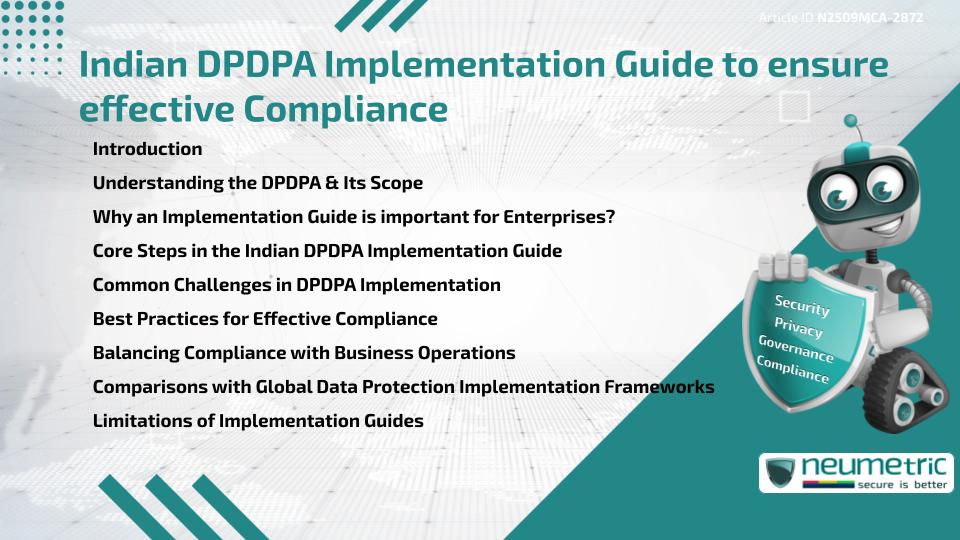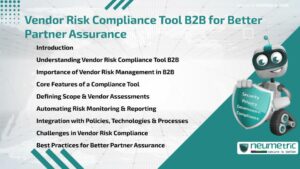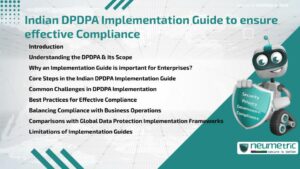Table of Contents
ToggleIntroduction
The Indian DPDPA Implementation Guide is a practical resource for Enterprises striving to comply with the Digital Personal Data Protection Act [DPDPA]. It provides structured steps to integrate Compliance measures into daily Operations while upholding Fairness, Transparency & Accountability. This article outlines key steps, common challenges, Best Practices & Global comparisons to help Businesses achieve Compliance without disrupting Operations.
Understanding the DPDPA & Its Scope
The DPDPA is India’s first comprehensive law governing Personal Data Protection. It applies to Enterprises of all sizes, requiring them to safeguard Personal Data, manage User Consent & prevent Misuse. The Indian DPDPA Implementation Guide helps Enterprises interpret these requirements into clear Operational strategies, ensuring both Legal adherence & protection of Customer Trust.
Why an Implementation Guide is important for Enterprises?
Compliance is not automatic; Enterprises must actively adopt processes to meet Legal Standards. An Implementation Guide:
- Breaks down complex requirements into actionable steps.
- Identifies areas of Non-Compliance early.
- Improves Business Objectives & Customer Expectations.
- Enhances Trust among Regulators, Partners & Customers.
Without guidance, Enterprises Risk misinterpretation, Inefficiency & Penalties.
Core Steps in the Indian DPDPA Implementation Guide
The guide typically includes:
- Data Mapping: Documenting where & how Personal Data is collected, stored & shared.
- Consent Mechanisms: Establishing clear processes for obtaining & withdrawing User Consent.
- Vendor Oversight: Ensuring Third Party Vendors comply with DPDPA requirements.
- Incident Management: Creating protocols for Breach Detection, Reporting & Resolution.
- Training Programs: Educating Staff on responsibilities under the law.
- Audit Trails: Maintaining Records to demonstrate Compliance.
These steps form the foundation of the Indian DPDPA Implementation Guide.
Common Challenges in DPDPA Implementation
Enterprises often face challenges, including:
- Complex IT Infrastructure: Legacy systems may not support Compliance Requirements.
- Resource Constraints: Smaller Organisations may lack trained Professionals.
- Operational Disruptions: Compliance measures may initially slow productivity.
- Costs: Upgrading Systems & training Staff requires investment.
These challenges must be addressed proactively to ensure smooth implementation.
Best Practices for Effective Compliance
To strengthen Compliance, Enterprises should:
- Conduct Gap Assessments before implementation.
- Automate Compliance monitoring & reporting.
- Standardise Policies across Departments.
- Provide ongoing training for Staff & Vendors.
- Engage External Experts for Independent Reviews.
Such practices ensure that Compliance becomes part of the Organisational culture rather than a one-time exercise.
Balancing Compliance with Business Operations
A major concern is balancing Compliance with efficiency. Overly rigid Compliance processes may slow down Operations, while lenient approaches Risk Penalties. The Indian DPDPA Implementation Guide encourages Enterprises to embed Compliance into Workflows, ensuring Security, Availability, Processing Integrity, Confidentiality & Privacy without hindering innovation.
Comparisons with Global Data Protection Implementation Frameworks
International Frameworks such as GDPR & HIPAA also emphasise structured implementation. The Indian DPDPA Implementation Guide reflects similar principles but adapts them for India’s unique digital ecosystem, where Enterprises range from Small Startups to Large Corporations.
Limitations of Implementation Guides
While useful, Implementation Guides have limitations:
- They cannot anticipate every Enterprise-specific scenario.
- Over-reliance may create a “tick-box” mentality.
- Smaller Enterprises may find it difficult to adopt every step.
Acknowledging these limitations ensures Enterprises apply the guide with flexibility & Professional judgment.
Takeaways
- The Implementation Guide helps Enterprises translate DPDPA requirements into practice.
- Core steps include Data Mapping, Consent Mechanisms, Vendor oversight & incident management.
- Challenges include Costs, Resource shortages & complex IT Systems.
- Best Practices involve Automation, Audits & Continuous Training.
- Compliance must be balanced with Business efficiency.
FAQ
What is the Indian DPDPA Implementation Guide?
It is a structured resource that helps Enterprises adopt Compliance measures under the Digital Personal Data Protection Act.
Why do Enterprises need an Implementation Guide?
It simplifies complex requirements, ensures readiness & helps build Customer Trust.
What are the key steps in the Indian DPDPA Implementation Guide?
They include Data Mapping, Consent Mechanisms, Vendor Oversight, Incident Management, Training & Audit trails.
What challenges do Enterprises face in implementing DPDPA?
Common challenges include high Costs, complex Infrastructure & lack of Skilled Staff.
How can Enterprises ensure effective implementation?
By conducting Gap Assessments, automating Compliance & engaging External Experts.
Does following the Guide guarantee Compliance?
No, it improves readiness but must be adapted to Enterprise-specific needs.
Can small Enterprises use the Indian DPDPA Implementation Guide?
Yes, though they may need simplified processes or outsourced support.
How does the Indian DPDPA Implementation Guide compare with GDPR?
It shares principles with GDPR but is adapted for India’s Business Environment & Regulatory Framework.
Need help for Security, Privacy, Governance & VAPT?
Neumetric provides organisations the necessary help to achieve their Cybersecurity, Compliance, Governance, Privacy, Certifications & Pentesting needs.
Organisations & Businesses, specifically those which provide SaaS & AI Solutions in the Fintech, BFSI & other regulated sectors, usually need a Cybersecurity Partner for meeting & maintaining the ongoing Security & Privacy needs & requirements of their Enterprise Clients & Privacy conscious Customers.
SOC 2, ISO 27001, ISO 42001, NIST, HIPAA, HECVAT, EU GDPR are some of the Frameworks that are served by Fusion – a SaaS, multimodular, multitenant, centralised, automated, Cybersecurity & Compliance Management system.
Neumetric also provides Expert Services for technical security which covers VAPT for Web Applications, APIs, iOS & Android Mobile Apps, Security Testing for AWS & other Cloud Environments & Cloud Infrastructure & other similar scopes.
Reach out to us by Email or filling out the Contact Form…





